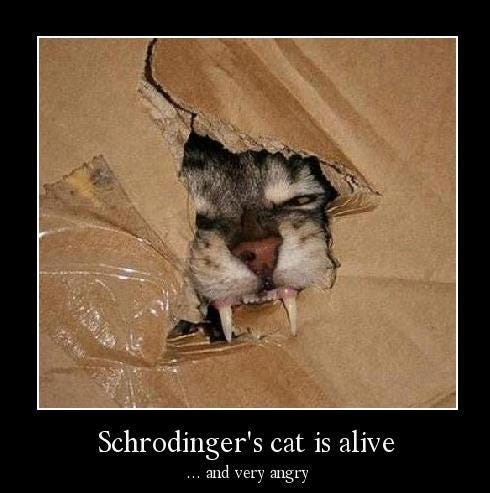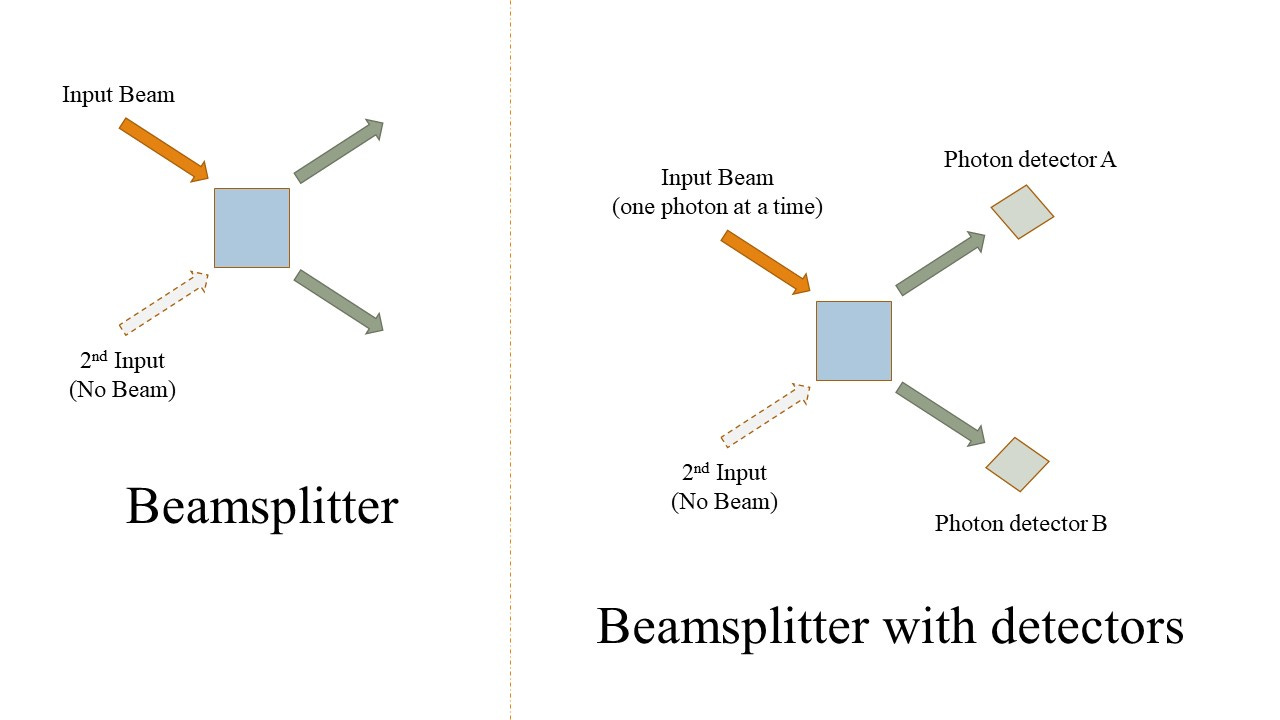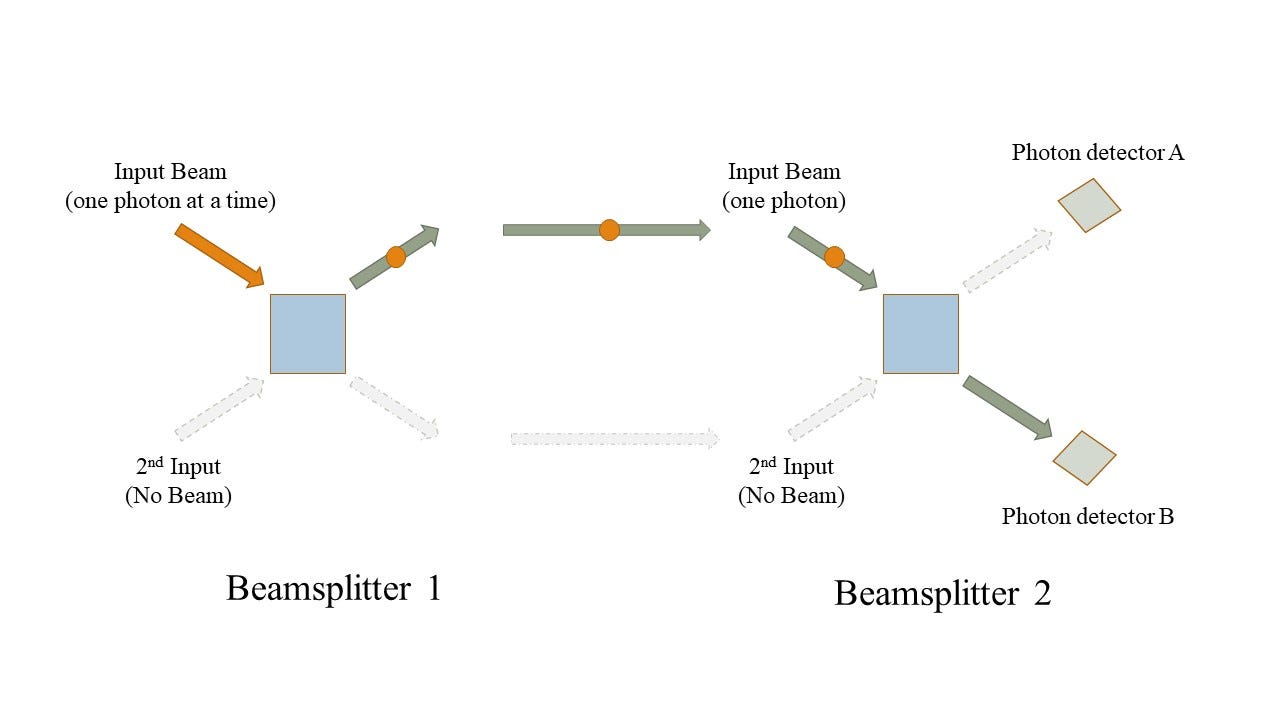Schrödinger's Virus
If you’re at all interested in quantum mechanics (QM) you’ve probably heard about Schrödinger’s unfortunate cat.
The cat is placed in a box along with some vial of poison gas. There’s also some other device which registers a “quantum” event (like the radioactive decay of an unstable element) and if this event happens this device will trigger the shattering of the vial.
So, if the event happens, poor Kitty will no longer voom no matter how many volts are applied. If the event does not happen, Kitty will be alive and probably very angry indeed.
Is the cat alive or dead before we open the box?
If you’re not at all familiar with QM, at this stage you’re probably wondering about the sanity of physicists. Of course the cat will be either dead or alive before we open the box!
Unfortunately, according to one popular version of how to interpret QM, the cat will be in some ghastly “superposition” of being alive AND dead. By dreaming up this hypothetical experiment, Schrödinger was trying to highlight the absurdity of this popular interpretation.
The problem is that according to the strict rules of QM we really do have to describe some situations using maths that makes it look like something is in this kind of superposition limbo of “being” in two contradictory states at the same time. It’s very strange.
It is crazy apparent consequences like these that have furnished nearly a century of arguments amongst physicists - and there’s still no perfect resolution. The closest to a fully consistent approach appears to be “all this technical maths stuff doesn’t mean anything - it doesn’t represent reality - it’s just a fancy way of connecting experiment preparation with experiment results”.
I have some sympathy with this interpretation, but I also think of it as the “Ostrich Interpretation” of QM. It’s burying your head in the sand and ignoring there’s a problem by claiming the problem doesn’t exist because all those squiggles on the page have absolutely nothing to do with what might be happening in the real world - it’s all some weird technical trick that just happens to give us the right results. The squiggles link the beginning and end, but say absolutely nothing about what’s “really” happening in between.
Having just realized how (some) scientists spend their time pondering such questions, you are probably now wondering why your tax dollars should fund these lunatics.
I’m one of those lunatics who think all this kind of stuff is important. I think the weirdness goes well beyond the squiggles, though. If you will permit me a little indulgence (we’ll eventually get to what all this has to do with viruses in a while) I can explain.
There’s a device in optics known as a beamsplitter. What does it do? Surprise, surprise, it splits beams. It has two inputs and two outputs. If I fire a laser beam into one input the laser beam is split into two outputs. A 50:50 beamsplitter sends 50% of the light one way and 50% of the light the other way. They can be very simple devices (essentially half-silvered mirrors).
Jumping over several steps, a laser beam can be thought of as being “made up” of squillions of light particles called photons. Let’s turn the volume down. We’re going to reduce the intensity of the input laser beam so that it’s sending in one photon a time. We’re also going to put photon detectors in the output arms of the beamsplitter. It looks like this
What do we find when we run this kind of experiment with a 50:50 beamsplitter?
We find that either detector A fires OR detector B fires. The photon is not “split” - it either goes one way or the other right? Furthermore, there is no way to predict which detector will fire. It’s completely random. So the photon goes into the beamsplitter and “picks” an output direction at random.
Not too strange - it all seems quite reasonable so far. Even the randomness may only be an apparent thing. The atoms in the beamsplitter are all jiggling about, and if we only could follow each of them we might be able to properly predict things.
But at this stage we can be fairly confident that the energy, the photon, all goes one way OR the other.
OK - let’s now imagine that the photon goes out on output arm A (from 1st beamsplitter). We arrange things (using mirrors) so that this photon goes into a 2nd beamsplitter.
It’s a beamsplitter so we know that this photon is going to “pick” one output at random, right?
Wrong.
We can arrange things (by adding a slightly different path length in the upper and lower arms) so that the photon is only ever detected in arm B of the 2nd beamsplitter. Same thing happens if the photon happens to pick output arm B at the first beamsplitter instead of A.
The only way to explain this is if something is going into both arms after the 1st beamsplitter. That something, whatever it is, interferes at the 2nd beamsplitter so that instead of a random output we get a definite output.
Putting in detectors after beamsplitter 1 : we see that the photon goes either one way OR the other.
Adding in beamsplitter 2 : we see that something goes in both arms after beamsplitter 1
What I’ve outlined here is a very “clean” version of the famous two-slit experiment. Feynman described the two-slit experiment as containing all of the mysteries of QM. Typical brilliant insight from this great, great physicist - cutting through all the BS at a stroke.
In maths terms I would have to describe the beamsplitter experiment using an equation that describes what’s “happening” in between the 2 beamsplitters with something that looks like this : |1,0> + |0,1>
Which is just a fancy way of writing down (photon in arm A, nothing in arm B) plus (nothing in arm A, photon in arm B).
This is the fancy “superposition” I mentioned earlier. It’s Schrödinger’s cat using beamsplitters and photons. The photon is in this state of “being” in one arm AND the other at the same time.
Forget the maths though - what’s happening is very weird. Do one thing and we see the light behaving like a particle (photon detected in one arm OR the other). Do another thing and we see the photons have wave properties (interference at 2nd beamsplitter).
So is light a wave or a stream of photons or both?
Yes, no, maybe.
There are just no pictures from our everyday experience to describe what’s happening with experiments like these - at least no-one has found any yet. ALL of the strangeness of QM derives from this (entanglement, for example, derives from application of this curious “which way” Schrödinger’s cat issue to 2 distinct Hilbert spaces).
The lesson to take away here is that things can look very different depending upon how we choose to measure them in QM. It’s more than just those famous blind men touching up an elephant. In QM we can’t ascribe definite properties to things in the absence of measurement - if we do things like that we predict results inconsistent with experiment.
I hope you’ve found this as fascinating as I do. I apologise if I’ve sent some of you into either a coma or anaphylactic shock. But what has this got to do with covid?
I was thinking about some of the overall virus “properties” we’ve been treated to and was struck by an analogy with quantum issues.
It’s a virus that many don’t know they have unless they are tested. They are in a superposition state of being ill and healthy until the testing ‘box’ is opened
It’s a vaccine that is in a superposition of being effective and ineffective. If you stand next to someone who is unvaccinated you’ve opened the box and now it’s ineffective.
It’s a virus that is in a superposition state of being deadly and not-deadly. If you sit down with a meal - you’ve forced it into the state of being “not deadly”. Similarly, if you sit down on a park bench you’ve forced the virus into its deadly state (you’d have been OK if you had a substantial meal in your pocket, obviously)
OK - you got me. These are not great analogies. I really just wanted an excuse to talk about my favourite topic - QM.
But look at the difference too. In QM we have apparently contradictory things going on. In QM, however, although it is difficult to construct a consistent explanation based on things we experience at a macroscopic level, the equations and maths we use lead to 100% correct predictions (so far). We may not be able to properly describe what’s “really” going on, but boy do we know how to calculate the fuck out of it - and we get it right.
With covid, both in terms of the supposed properties of the virus and our responses to it, we have an unholy mess of contradictions and reversals of previous understanding. It’s an absolute clusterfuck, and almost none of the predictions based on this mish-mash of gibberish have come true. Lockdowns still haven’t worked - anywhere. All of those predictions of catastrophe if restrictions were relaxed? Same success rate as QM - they were 100% correct at predicting the opposite outcome.
Vaccines would be our way out? Great prediction. Next time try reading chicken entrails, it might give you a better result.
Almost everything they’ve said about covid has been wrong. It’s frankly astonishing. I can’t think of anything they’ve been right about. Masks - wear one. No, two. As long as it’s an N95. Just 2 shots and we’re done. 3 and we’re done. Sorry, it’s got to be 4. If you’ve had 2 shots you can’t be infected or transmit the virus.
I’m used to being confused and uncertain - after all, QM will seriously do your head in if you try to understand it in any non-mathematical way. I’m not used to seeing so many predictions go wrong. I’m not used to not fixing your ideas if your predictions have gone wrong.




During the first season of the pandemic, arguments for and against intervention were based on the same underlying assumption about transmission of the virus – an assumption which may well be wrong. That assumption is direct, measles-like transmission.
For a new measles-like virus we might reasonably expect to see exponential growth as the infected become infectious and the largely susceptible population supplies more bodies to be infected. As ever larger numbers are infected and begin to recover, the remaining susceptibles become harder to find, spread slows…you know how it goes. This is the SIR model - Susceptible, Infected, Recovered.
This is supposed to describe a single epidemic wave.
Team Panic says, ‘OMG, exponential growth! We’ll all be infected twice over by Tuesday week.’
Team Evil says, ‘Everybody, chill. It won’t get you all. We know it will only infect, like, 60 or 80% of the population. That’s herd immunity, man.’
This, of course, further terrifies Team Panic: ‘Monsters!’
As the great epidemiologist R.E. Hope-Simpson pointed out, pandemics – in the form of influenza epidemics – explode, rapidly infecting huge numbers of people, and then, just when it looks as though the whole population is going to get it, cases peak abruptly, and in a couple weeks or so it’s all over.
It seems that such epidemics usually attack no more than 15% of a population, quite unlike predictions based on the SIR model and direct, measles-like transmission.
Hope-Simpson questioned the model of direct spread. It appeared to him that epidemics ended just as they ought to be set to really take off. He pointed out numerous shortcomings in what he called the ‘current concept’ of direct spread.
If our concept of transmission is wrong, measures designed to interrupt the spread of the virus are likely to fail; promises that it’s all over now because so many people must have been infected will also be wrong.
And here we are. Competing ideas about how to respond to a virus, both of which are likely to be wrong.
Team Panic says, ‘See, it wouldn’t have ended without our measures!’
Team Evil says, ‘See, it ended because of herd immunity, not your silly measures! It’s over’
Six months later we have the same argument all over again.
I suppose the only paradox here is that the opposite of a bad idea is usually another bad idea.
It’s a virus that causes long-term symptoms even if you don't catch it. Recently, the University of Mainz published a study on long Covid. Around 40% of people that tested positive for Covid reported some symptoms even six months after infection. BIG story in the media. However, what the media did not report but what was in the study nevertheless, is the fact that the (much larger) control group of non-infected people had 40% long Covid symptoms as well.